Explosion of vacation rentals in Cocoa Beach leaves residents frustrated and angry
When former Cocoa Beach Mayor Ben Malik moved into his current home in 2008, his Brevard Avenue neighborhood was a quiet residential area a mile or so from the city's tourist hub downtown.
But an explosion of vacation rentals in the beach town has brought the tourists to him, with one vacation rental next door and one directly behind his home. Earlier this year, he got so fed up, he put his house up for sale. There was little else he felt he could do as state law limits local ordinances about the industry.
“This is what I got to listen to last night. That’s behind me,” Malik said earlier this year, playing a video on his phone capturing loud music blaring in the darkness from the short-term rental bordering his backyard.
Malik later took his house off the market after one sale fell through, and he recently stepped down as mayor, when he took on a new financial-services job that does not allow him to hold public office.
Still, new vacation rentals — private homes rented short-term to tourists through websites like Airbnb and Vrbo — continue to pop up around the city seemingly overnight, like pastel-colored mushrooms. Locals walking or biking through town can easily pick out the Instagram-ready vacation rentals, with their pastel colors, surf-related decorations and keypad entry systems.
More: Instagram-worthy symbolism helps draw people to stay at vacation rentals
More: Florida alliance seeks to help operators of vacation rentals navigate their way in sector
Cocoa Beach resident John Lose views single-family neighborhoods as “the lifeblood of a community,” a place where families and schoolchildren live alongside neighbors who attend beach cleanups and help with civic work around town.
He fears the long-term ramifications of vacation rentals on that dynamic in this city of 11,000 people.
“One property at a time, we're losing that stability. We're becoming more unstable. We're losing the support for the schools and the volunteerism,” Lose said. “Because, as houses turn, the preponderance of the new owners are merely investors, and they're not invested in the community. They're just trying to turn a buck, basically.”
Changing a city's character
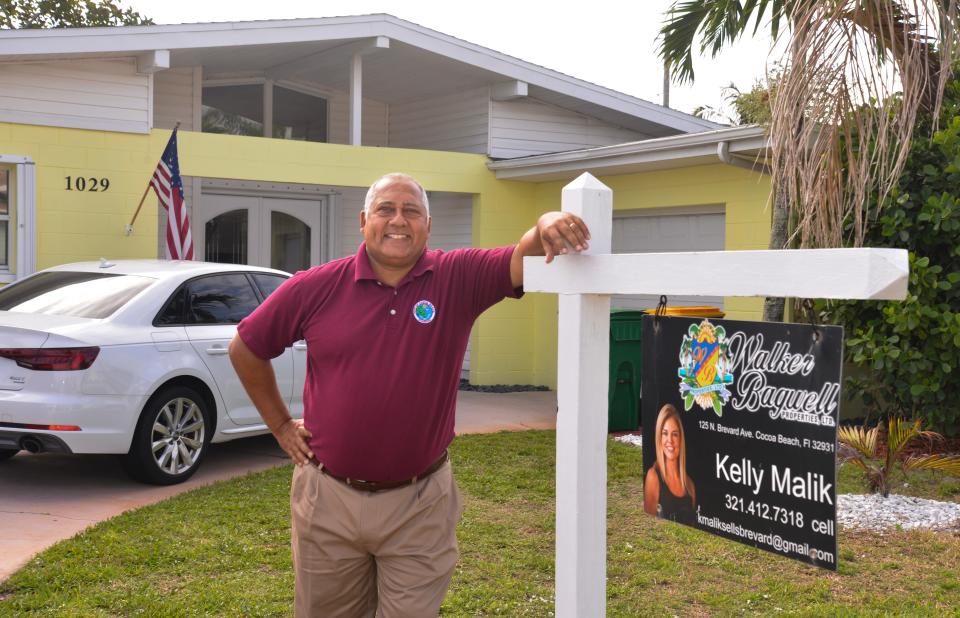
More: Want to turn your property into vacation rental? You could be risking homestead exemption
More: With Cocoa Beach population falling, so is enrollment at two traditional elementary schools
While vacation rentals are available throughout Brevard County, no other part of the Space Coast has the density of rentals that Cocoa Beach has. Consider:
The Cocoa Beach building department estimates that one in five of the city's 2,442 single-family homes might be being used as a vacation rental.
The city's population is shrinking at the same time it is exploding in Brevard County and statewide. That potentially puts the area at risk of losing one of the three elementary schools that serve the city.
Many of the vacation rentals had been modest duplexes, bungalows or apartments that served as affordable housing, exacerbating an already tight rental market. Experts say the rise in vacation rentals also is driving up the cost of homes for sale.
"It's changing the character of Cocoa Beach," Malik said. "It's a citywide phenomenon. We're losing our neighborhoods. It's ruining our quality of life. For me, it's personal."
Malik said he believes economics are playing a role in the conversion of homes in Cocoa Beach. A homeowner might in the past have rented a single-family home for $2,000 a month. But that same house could rent as a vacation rental for $300 a night. And, even if the home is rented for just 15 nights a month, that's $4,500 in income that month.
Malik is tired of having new neighbors every week, some of whom are too rowdy for his taste, with their drinking, loud music and partying.
“They’re all here on vacation. And I feel bad, because they’re spending money, and they want to have a good time,” he said.
“But I don’t want to live next to a hotel."
Coach Beach's 'hands are tied'
Part of the reason vacation rentals are so popular in Cocoa Beach is right there in the city's name: Beach.
As the closest beach town to Orlando, Cocoa Beach has long been the tourism capital of the county. Every winter, shivering northerners come to town to escape their frozen hometowns. And every summer, folks from the Orlando area stream east on State Road 528 — the Beachline — in search of ocean breezes.
Additionally, increasing passenger counts from Port Canaveral ― the world's busiest cruise port — have increased the demand for vacation rentals, as cruise passengers seek a place to stay along the Space Coast for one or more nights before or after their cruises.
But a law the Florida Legislature passed in 2011 has kept the city from trying to keep the rentals under control.
More: Short-term rentals cause headbutting, conflict in Indian Harbour Beach
That state law prevented Florida municipalities from passing ordinances to regulate vacation rentals. Existing municipal ordinances on vacation rentals were grandfathered in, but Cocoa Beach did not have such an ordinance in place.
Cocoa Beach previously had approved land development codes under its zoning rules related to vacation rentals, but they were not ordinances, so they did not fall within the grandfathering provision, and no longer were allowed under the new state law, Malik said.
Malik even addressed the issue of vacation rentals earlier this year during the annual meeting of Brevard County's delegation to the Florida Legislature, telling the legislators that short-term rentals have "become, frankly, a nightmare for a lot of us in our town. There's a place for them. It just doesn't belong, frankly, in (residential) neighborhoods. It belongs in mixed areas of commercial" development.
Malik said Cocoa Beach officials regularly get emails from people upset about vacation rentals in their neighborhood, "but our hands are tied."
'It's a constant problem'
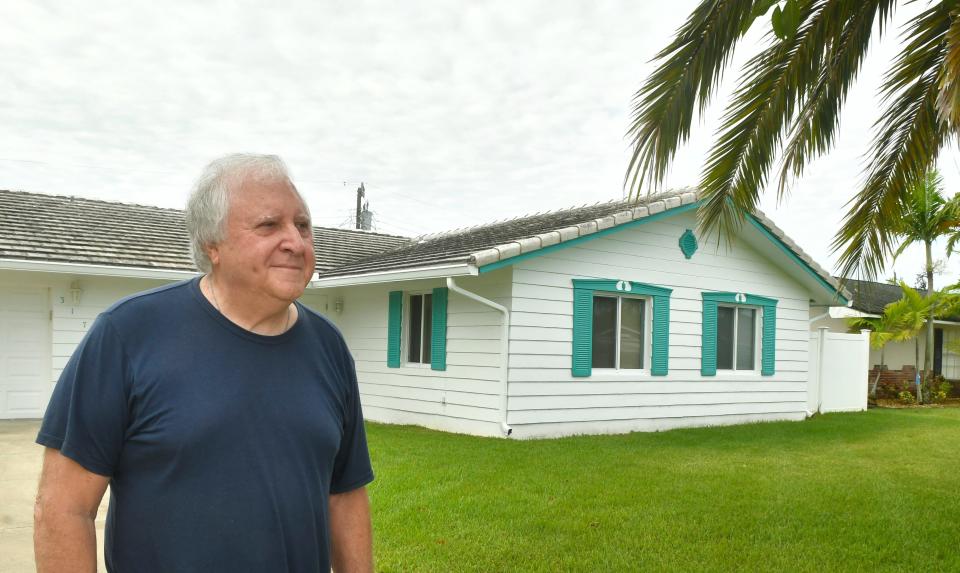
Frank Klotz, a resident of Cocoa Beach's Venetian Way neighborhood, said he's not thrilled about having two vacation rentals on his block.
"It changes the whole picture of the neighborhood," said Klotz, a retired space industry worker who has lived in the Cocoa Beach/Cape Canaveral area since 1972.
Klotz said a big concern is safety in the neighborhood. On one occasion, he had to call the police when a renter at a nearby vacation rental came onto his property and that of another neighbor.
"In this day and age, you need to know your neighbor," rather than having someone different living in a house every week, Klotz said. "These individuals are there just for one, two, three days, and they're gone, then another group takes over. It's a constant problem with different people."
Additionally, Klotz said having multiple vehicles parked on the lawn of a vacation rental is not a good look for the neighborhood.
"There's a lot of noise that goes on, and sometimes there's some vulgar and foul language being shouted," Klotz said.
Cocoa Beach resident Janice Scott detailed her concerns about vacation rentals during a City Commission meeting in June.
Scott, a former mayor of Cocoa Beach, related a recent complaint from a homeowner across a canal: “There are 20 people out at the pool screaming and yelling. There are eight cars in front.”
Even with those issues, Scott said, many residents are reluctant to bother police by reporting noise complaints, particularly over three-day weekends when the force is stretched thin.
Lose said he doesn't see anything inherently wrong with property investors who rent out their homes. His problem is when the renters get out of control.
"We need capital infusion. They bring positives to the neighborhoods, because they generally fix blighted properties up," Lose said. "So we all win when a blighted property gets improved. So there are some benefits to it. But the overarching negative is that it erodes the community.”
More: 'Soul of Brevard County' up for debate as Commission looks at expanding vacation rentals | Rangel
During an August 2022 City Commission meeting, Angela Holstein-Noble — who has worked part time cleaning vacation rentals in the city — said longtime Cocoa Beach residents with waterfront homes are seeing their neighborhoods overrun by strangers.
Previously, folks may have had the same neighbor for years, but now, "they wake up, and they have a different neighbor every day of the week,” Holstein-Noble said.
“There's no background checks done on anybody. There might be on the person that rents it. But you don’t know who’s actually coming to the home,” Holstein-Noble said.
Holstein-Noble recalled an instance in which she cleaned up after a party crammed 10 guests inside a two-bedroom home, leaving trash strewn across the lawn.
Among other concerns among some Cocoa Beach residents who live near vacation rentals: Renters getting drunk and out of control, using the rental's swimming pool at 2 in the morning or not cleaning up after their dogs.
Renters priced out of town
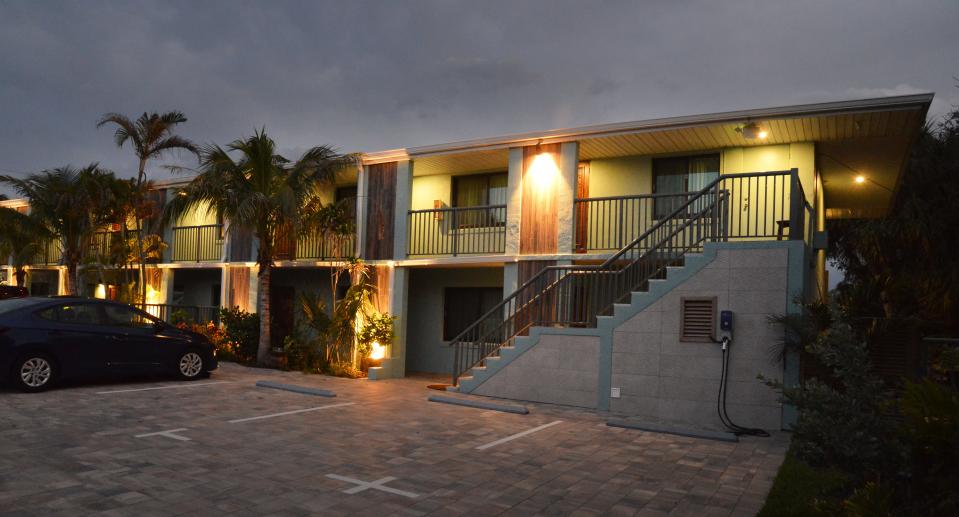
Vacation rentals are bringing more tourists to Cocoa Beach, but they also make it harder for those working in the tourism industry to live there.
Malik said the conversion of homes and apartments to vacation rentals ― including those tied into major vacation-rental companies like Airbnb and Vrbo ― also is reducing the conventional housing inventory in the city.
"It's causing an affordability crisis," Malik said. "It's pricing people out" from living in Cocoa Beach.
"What's left is pretty restrictive related as to those who can afford to live here" in Cocoa Beach, said Tom Williamson, president of the Cocoa Beach Area Hotel and Lodging Association, as well as a general manager and partner in the hotel company Ocean Partners Associates.
For example, Williamson said, many hospitality industry employees who work beachside have difficulty finding a place to live that they can afford near their workplace, forcing them to live far from their jobs. And that issue is compounded if they don't own a dependable vehicle to get them to and from work, because of limited public transportation in the area.
"It's been tough," Williamson said, adding that this housing issue has exacerbated the challenges the hospitality industry faces in hiring people to fill staff vacancies.
Holstein-Noble said that, while her cleaning work at vacation rentals has brought her extra income, she has also seen the effect it has had on renters.
She told city commissioners that she knows at least five local restaurant workers who had left town because they no longer could afford to live in the city.
“They're not renting to the renters anymore. They're making more money in Airbnbs versus renting,” Holstein-Noble told the City Commission.
“So what's happening is, in order to not evict them, they’re jacking the prices up, and people say: ‘Well, we can't afford it.’ Therefore, people leave. And then they turn into Airbnbs,” she said.
There are indications, though, that the tide may be turning. "For Rent" signs have been popping up around the city, perhaps an indication that too many rentals were converted to vacation rentals, saturating the market.
Hotels claim uneven playing field
Williamson said hoteliers face unfair competition from vacation rentals because hotels have additional requirements to perform on everything from construction standards to inspections. And the gap is even more apparent when the vacation rental is operating under the radar without formally registering as one.
"It's not an even playing field," Williamson said.
Eric Garvey, former executive director of the Space Coast Office of Tourism, who currently is chief operating officer of the Baugher Hotel Group, which operates five hotels in Cocoa Beach and Cape Canaveral. said business travelers connected with the space industry and cruise customers have been mainstays of the business at his company's hotels. But he estimates that, among the non-cruise leisure traveler segment, his company's hotels have experienced about a 20% drop in business because of the increased availability of vacation rentals.
Additionally, hotel industry officials say current height and density restrictions on development within Cocoa Beach further hurt them when competing against vacation rentals.
"It just makes it impossible to build a hotel" in Cocoa Beach without clearing a number of hurdles, Garvey said. "The short-term rentals are filling the gap."
The hurdles are so great that Garvey's company opened two new hotels in Cape Canaveral since 2020, with plans for two more, rather than expanding in Cocoa Beach.
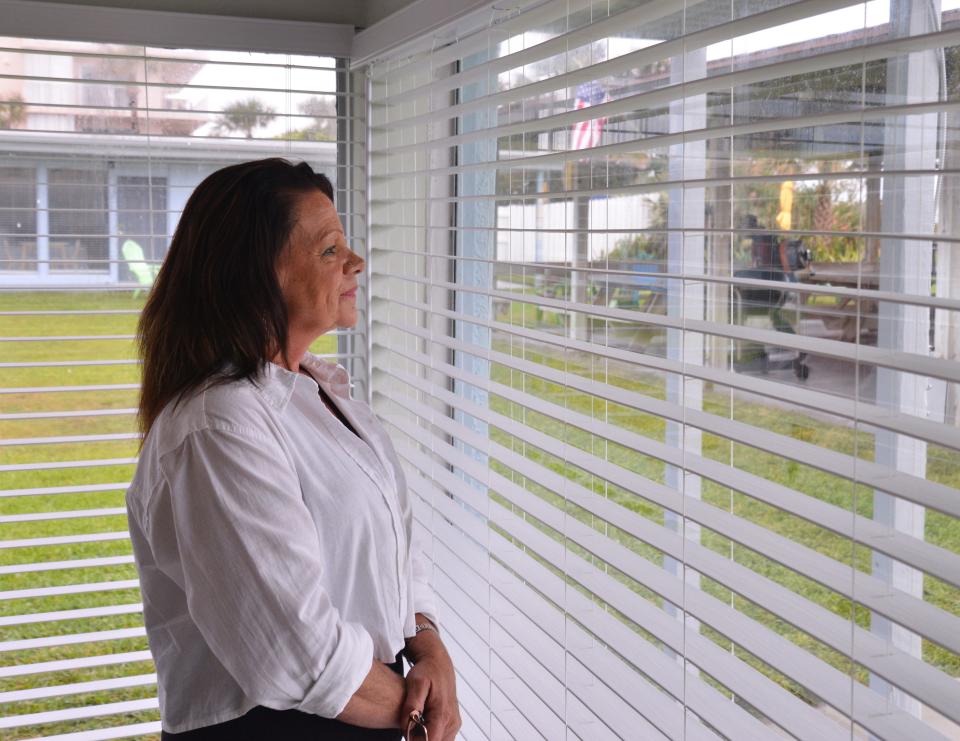
But not every hotel operator has issues with vacation rentals.
Sea Aire Oceanfront Inn — which predates the vacation rental boom by generations ― is a 17-room hotel built in 1950 that has hosted guests like NASA’s Mercury 7 astronauts and 11-time world surfing champion Kelly Slater, a Cocoa Beach native.
The downtown Cocoa Beach historic motel has seen little impact from vacation rentals, General Manager Chelsea Kahl said.
Why? She cited Florida’s booming tourism numbers and the inn’s bevy of loyal repeat customers ― who even booked up the mom-and-pop during May and September, two traditional slow months. Same for the ownership group’s sister property, the 1961-vintage South Beach Inn, with 19 rooms just south of Cocoa Beach city limits.
“We do have a lot of regulars who have been coming here for years,” Kahl said. “We have the ones that come over from Orlando for a weekend. They know the room they want. They know the price.”
More and more passengers from Port Canaveral’s booming cruise business have booked rooms in recent months, said Roseann Moore, assistant general manager.
“This year, as far as tourists go, we have been sold out almost every night for months," Moore said. "Months on end. It’s incredible."
Vacation rental owners push back
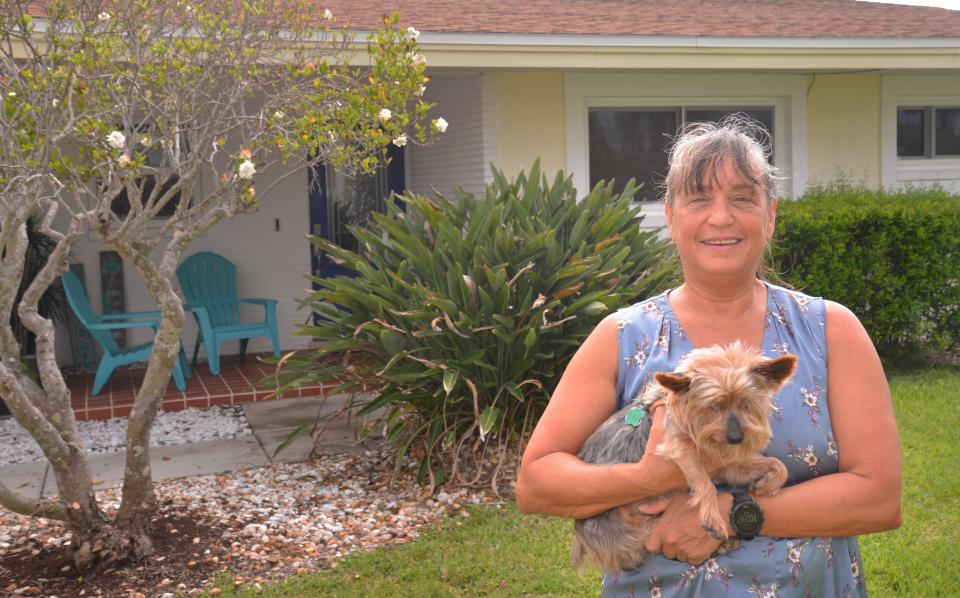
Zena Courtney converted a single-family home in the residential neighborhood off Minutemen Causeway into a vacation rental before the COVID-19 pandemic struck. She said a long-term renter wouldn’t cover the monthly mortgage at that time.
The retired Boeing engineering manager opposes city ordinances targeting short-term rentals. She said she strictly enforces noise levels from 10 p.m. to 8 a.m. using indoor and outdoor monitors, and she receives alerts on her phone if decibel levels get too loud.
“I have security cameras for front and back. I have noise-aware monitors,” Courtney said.
“We support the local economy. I have a cleaner who comes in every time. She charges a living wage. I have yard people. I have a pool person,” she said.
Courtney said her vacation rental’s Vivint doorbell camera captured footage of a thief who stole a boat from a neighbor a few houses away.
“It’s extra security for the neighborhood,” she said.
And, regarding noise, she said she can clearly hear outdoor weekend music emanating from downtown Cocoa Beach, nearly 1 mile to the east.
“I can hear it from here," Courtney said. "Do I complain? No.”
“Vacation rentals have been here forever. It’s just, now there’s an app. So you can see where they are,” Courtney said, in response to opponents.
Denis Hanks, executive director of the Florida Alliance for Vacation Rentals, said he believes his industry is being unfairly targeted.
Hanks said vacation rentals are subject to city, county and state regulatory compliance, including by the Florida Department of Business and Professional Regulation, while hotels are generally regulated at the state level. He said recent legislation proposed in Tallahassee would have introduced new ways to suspend and shut down vacation rental operators for various violations.
“But if there’s a party at a hotel room, they don’t shut down the entire hotel because there’s one party, and the guest is acting up,” Hanks said.
“When I used to live down near Orlando, my worst neighbor was a permanent neighbor behind me ― and he would have a party every weekend,” Hanks said. “You can have a bad neighbor, whether it be a permanent resident or one who spends a week.”
“So we’re trying to find that balance where we’re treated on a level playing field with the hotel industry,” Hanks said.
Legislator seeks to strike balance
Florida Rep. Tyler Sirois, a Merritt Island Republican whose district includes Cocoa Beach, said the trick is "striking the right balance" between private property rights of people being able to rent out their homes, and regulations to keep noise and parking issues in check.
Sirois said he realized that "you do kind of have the bad actors in Cocoa Beach" and elsewhere, when it comes to vacation rentals, adding: "I want to make sure we hold bad actors accountable."
"Nobody wants to be next door to thumping music, with 10 cars parked outside," Sirois said.
Sirois also says the proliferation of vacation rentals can work to the detriment of efforts to spur development of more affordable housing in a community.
Sirois ― who chairs the House Regulatory Reform and Economic Development Subcommittee that deals with vacation rental legislation ― said various proposed changes in vacation rental regulation have come before the Florida Legislature in recent years.
But the House and Senate have not been able to reach a consensus, partly because of competing interests lobbying the legislators. Some want more local control over vacation rentals, while others want the state to have full preemption of local regulation of the issue.
"It's an issue we will work on again this coming session," Sirois said.
Businesses like increased customers
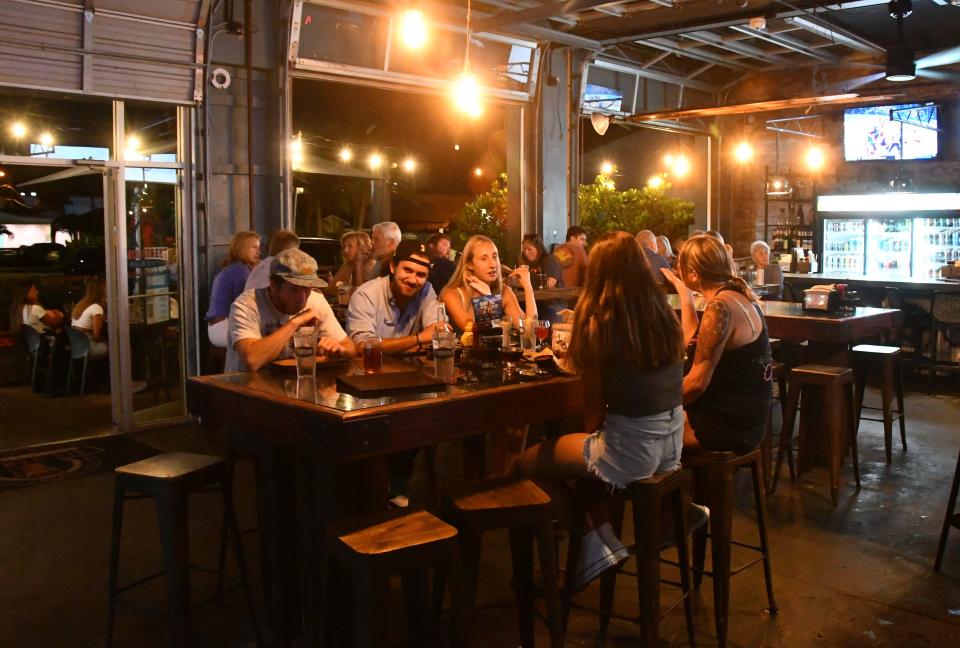
Not everyone is opposed to the expansion of vacation rentals in Cocoa Beach. Businesses along State Road A1A like the added revenue that tourists bring.
"We are just really constantly busy 12 months out of the year," said Sarah Gottesfeld, marketing manager for the 4th Street Fillin Station Gastrobar & Grill on State Road A1A.
Gottesfeld said tourists who stay at local hotels or vacation rentals typically according for 25% to 40% of the revenue at the restaurant, depending on the time of the year, adding that tourist revenue accounts for "a huge part" of the local economy in Cocoa Beach.
"We love all of our customers," Gottesfeld said.
Susan Awad owns All Around the House, a furniture and art store that moved from Melbourne to downtown Cocoa Beach two years ago. She said vacation rentals provide an economic boost.

“I just sold a king bedroom set this morning that’s very nice to a person with an Airbnb," Awad said in a recent interview. "And, Saturday, I had sales to people with an Airbnb. Often, they will furnish them with very nice secondhand furniture.”
“Until it's the season, it's really not that busy here. So I certainly think Airbnbs are beneficial, not just for me doing furniture, but for restaurants and bars, and people that buy clothes. Almost no matter what you're buying, it doesn't hurt to have more people,” Awad said.
On the other hand, Awad said vacation rentals can be “a mixed bag.”
She said they should be registered with the city, and clearly post rules and regulations, while tenants should follow the noise ordinance to avoid disrupting their neighbors. She said she pays close attention to detail before she books an out-of-town short-term rental.
“They will actually even tell you on the site, ‘This is still really noisy here after 11 because it is a party town, it's a party place.’ And, me, automatically: I’m not going there to party, so I'm not going to stay there. But I really appreciate that they put that on there,” Awad said, referring to listing details.
“And, by the same token, if they put that it has to be quiet by 9 o'clock or by 10 o'clock, I appreciate that as well. Because I know that I can stay there and enjoy a peaceful evening, and not have it be too loud,” she said.
City Commission takes action
Malik said the number of vacation rentals in Cocoa Beach "is just growing by leaps and bounds," and many are not registered with the city.
The Cocoa Beach City Commission has beefed up its still-limited vacation rental ordinance, mandating that owners in the single-family residential zoning district pay City Hall registration fees and take measures to limit “extreme noise levels, late-night activities, on-street parking issues and traffic congestion.”
The ordinance caps the maximum number of vehicles, including boats, at four at any vacation rental. Properties that rack up three noise violation citations during a 12-month span may be deemed a “noise nuisance property” subject to further penalties.
Cocoa Beach Director of Development Services Tanja McCoy said typical single-family households may host large gatherings just a few times a year, unlike vacation rentals.
“Birthdays, holidays, things like that: Maybe they’re having five parties a year. Whereas, with a vacation rental, they could be having a party every week,” McCoy said.
“So that’s going to add to our noise, parking, safety (issues), requiring more services from our police and fire departments, for sure,” she said.
To ensure compliance with the beefed-up vacation rental ordinance in single-family neighborhoods, Cocoa Beach officials have hired the consulting firm Rentalscape to scrape the internet and analyze the city’s 2,500-odd vacation rental ads. Many of these ads are for condominiums, or they are duplicates of the same properties on Airbnb, Vrbo and other platforms.
Rentalscape uses “artificial intelligence, machine learning and advanced data mining to detect and identify" short-term rental operators, according to a company brochure.
Thus far, Rentalscape has identified 238 short-term rental properties within single-family-zoning neighborhoods, 86 of which are licensed, McCoy said.
To respond, a new code compliance officer has been hired to oversee on-site inspections, and a vehicle has been dedicated to the cause. The city also is mailing courtesy letters to owners of suspected vacation rentals, seeking business tax receipt registration and other information.
“The program has ramped up. We feel that next (fiscal) year, we’ll have a very clear picture, starting in October, because we’ll have all of these items in place and moving efficiently,” McCoy said during a City Commission budget meeting in July.
Market could be softening
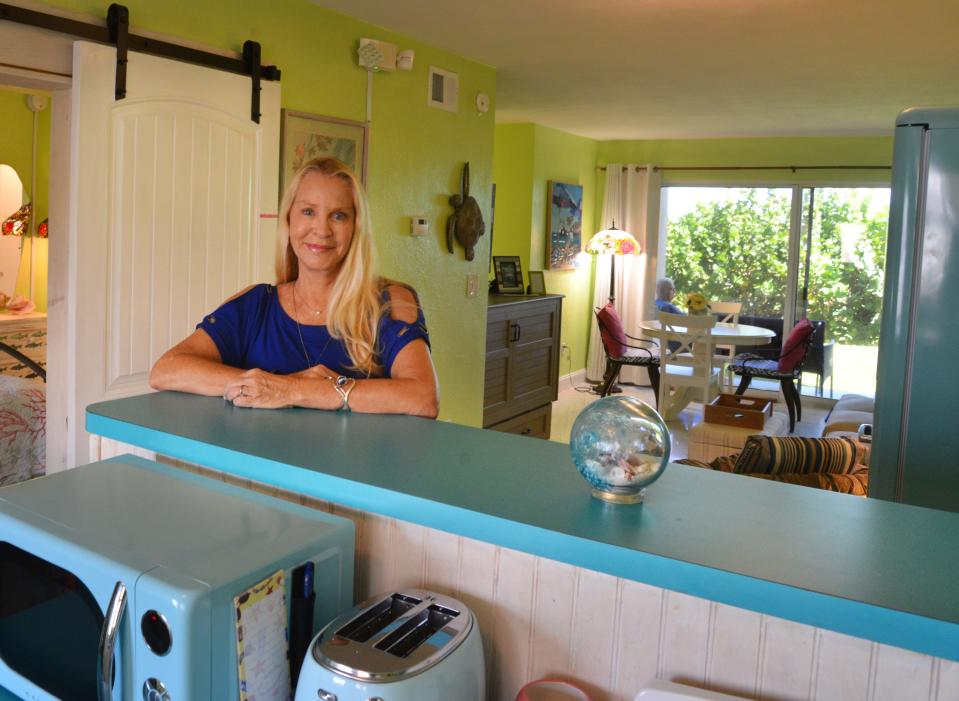
Lifelong Cocoa Beach resident Pamela Durkin is broker/owner of Coconut Properties Florida Real Estate. She believes City Hall’s estimates that state 20% of single-family homes could be vacation rentals are too high.
In fact, Durkin said prices are plunging across Brevard County’s barrier-island market of Airbnb listings because of reduced demand.
“There's such a flooded market of Airbnbs, and nobody wants to come here during September-October because it's hurricane season. So if you go on an Airbnb site, you'll see that a lot of the Airbnbs have dropped their daily rates from $200 to $125 or $100,” Durkin said.
“They're just not getting rented. They have to really drop their prices low. My cleaning lady, she said she's very slow. She does strictly Airbnb rentals. She's super-slow. She cleans from Cape Canaveral to Indialantic. And she's very, very slow. All her Airbnbs are vacant,” she said.
Durkin said Cocoa Beach’s high housing costs are a product of living in a landlocked community ― unlike rapidly expanding Viera. Also, Cocoa Beach is blessed with desirable coastlines along the ocean and the Banana River. She recently visited Missouri, and noticed houses were selling for $300,000 and $400,000 “in the middle of nowhere.”
“I don't think it's just us. I think it's that way all over the nation. Because an Airbnb is a good investment, because real estate is always a good investment,” Durkin said.
Vacation rental taxes
Vacation rental owners are supposed to collect sales and tourist development taxes when they rent out their properties.
Brevard County Tax Collector Lisa Cullen said there now are fewer instances of property owners deliberately or unknowingly avoiding paying those taxes. That's because of agreements her office has with Airbnb, Vrbo and other rental platforms to collect those taxes from the operators of vacation rentals who advertise on those companies' websites.
But Cullen says her office still gets tips from residents about people who may be operating under the radar and not collecting the required taxes. Cullen's office investigates those complaints, starting with a letter to the suspected offenders, informing them of the requirement to collect the taxes.
According to data compiled by the Space Coast of Office of Tourism, vacation rentals account for about 33% of the the total revenue revenue collected from Brevard's 5% tourist development tax on hotels, vacation rentals and other short-term rentals. When the final numbers are in for the just-ended county budget year, the Officer of Tourism expects more than $25.7 million in tourist tax revenue, with vacation rentals accounting for about $8.5 million of that.
Residents with concerns about vacation rentals say that's all well and good. But they still have their objections to them.
Klotz, the resident of Venetian Way, fears that, as the number of vacation rental properties continues to increase, more families with children will move out of Cocoa Beach. That could lead to doctors closing shop in Cocoa Beach to seek a practice in a more family-dominated community and could mean the closing of an elementary school.
"There's a ripple effect," Klotz said. "The families are moving from the neighborhoods."
Rick Neale is a space reporter at FLORIDA TODAY (for more of his stories, click here.) Contact Neale at 321-242-3638 or rneale@floridatoday.com. Twitter/X: @RickNeale1
Dave Berman is business editor at FLORIDA TODAY. Contact Berman at dberman@floridatoday.com, on X at @bydaveberman and on Facebook at www.facebook.com/dave.berman.54
This article originally appeared on Florida Today: Cocoa Beach feels impacts from growth of vacation rentals

